As the balloons and streamers flew to celebrate the start of 2021, a passionate group of Australian enthusiasts was in mourning. At that moment, Holden, Australia’s arm of the General Motors empire, ceased to exist. Not only did it mark the end of a company that was considered to be “Australia’s own,” but it marked the end of a factory motorsport heritage that dated back more than half a century. Part of that motorsport heritage is now up for sale, with two cars that were part of the company’s homologation process now set to go to auction. Both are low-mileage survivors, and with the passion that Holden enthusiasts feel, both should make excellent long-term investments.
The first of the pair is this 1988 Commodore Group A SV, which is listed for sale here at Lloyds Auctioneers. It is hard to explain the importance of this car without providing a brief history of Australian motorsport. The country’s premier category since the late 1960s has been touring car, or saloon car racing, in one form or another. After using a unique local formula through the 1970s and into the 1980s, Australia tied itself to the International Group A category from 1985. This brought with it a specific set of requirements, and it demanded manufacturer involvement. Manufacturers were required to produce 5,000 examples of a model in basic form, along with an additional 500 examples of any racing evolution model. From 1980, Holden had performed its motorsport homologation via the late Peter Brock’s HDT Special Vehicles operation. However, there was a fairly nasty falling out between the two companies in 1987, and Holden severed its ties with Brock’s organization. A new company, Holden Special Vehicles, was formed as a joint-venture company between Holden and Tom Walkinshaw Racing (TWR). The first homologation special that the new company produced was the Commodore VL SS Group A SV, which is the first car that I am featuring in this article. Based on the standard Commodore V8, it was fitted with a 21-piece fiberglass aerodynamic body kit that TWR developed in a UK wind tunnel. This kit was an acquired taste because while some people embraced it, others gave it the unflattering nickname of “the plastic pig.” While it wasn’t the prettiest thing on the planet, the kit made a significant difference to the car’s aerodynamic efficiency and downforce. Buying a Group A SV meant owning a car that was finished in a color called Panorama Silver. This was named after the legendary Mount Panorama, the home of Australia’s iconic long-distance race conducted every October. Just think Daytona 500, but with more beer! It didn’t matter how a manufacturer performed during the rest of the season, a win at Mount Panorama meant that they’d had a successful year. This SS is a spotless survivor, with panels and paint that are faultless. It wears its original wheels, and all of the correct aerodynamic pieces remain in place. The decals look crisp, and the Commodore looks like it has just rolled off the showroom floor. This is hardly surprising, considering the odometer shows a genuine 1,479 kilometers or around 919 miles.
There was no questioning Holden’s commitment to motorsport in the 1980s. Until 1985, its Commodore and Torana race cars were powered by a 308ci V8 that was a uniquely Australian design. However, Group A brought with it a complicated structure of rules governing vehicle weights and tire widths. Engine capacities determined these, and initially, Holden found itself in a tough spot with the Commodore. At 308ci, the V8’s capacity was 5,044cc. This capacity lifted the car into a higher weight bracket, putting additional strain on the tires, which had a maximum width of 12 inches. The width was something of a moot point because it was physically impossible to fit 12″ tires under a Commodore’s wheel arches. If the capacity could be dropped below the magic 5,000cc mark, the minimum weight would drop by a substantial 80 kilograms, or around 180lbs. Holden came to the party in 1985 by reducing its engine’s capacity from 308ci to 304ci. From a metric perspective, that meant a drop from 5,044cc to 4,987cc without any engine power loss. Thus, the Commodore could run at the lower weight on 11″ tires that did fit under the fenders. Before the introduction of the Group A SV, induction for these V8s was via a 4-barrel carburetor, but this model saw the introduction of fuel injection to a Commodore for the first time. The new engine featured a revised block casting, cylinder heads with better gas flow, special conrods and pistons, and bulletproof roller rockers. Where its predecessor had produced 183hp in road-going form, the new SS pumped out an impressive 241hp. Due to homologation requirements, all of these Commodores were built with a 5-speed T56 manual transmission, as this allowed them to use the racing Getrag unit in competition. While the exterior styling might not have made it a lot of friends, it was a different story when potential buyers looked at the new V8. Although the original intention had been to produce 500 cars to meet the regulations, 750 eventually found their way to new homes. This car appears to be completely original and numbers-matching. With its current odometer reading, it may well be the lowest mileage example in existence today. It isn’t clear whether the car is roadworthy, but the engine bay’s condition suggests that it has been meticulously maintained.
For the local competitors, one of the most significant advantages of the Group A regulations over the previous ruleset was that while the earlier regulations required interior trim and equipment to remain intact, Group A cars could have all of this stripped out. That meant that a Group A road car could be nicely equipped because all of the luxury features were destined for the bin. The Commodore Group A SV came equipped with air conditioning, power windows, power locks, a premium AM/FM radio/cassette player, a console, and sports gauges. This interior presents as nicely as the rest of the vehicle, with no visible wear on the heavily bolstered seats. The plastic trim and vinyl are flawless, while there is no visible wear on the carpet or the leather-wrapped wheel. Overall, this entire car is in showroom condition, and while the bidding currently sits at A$220,000, I wouldn’t be surprised if it broke the $1,000,000 barrier.
The second homologation special that is on offer here at Lloyds is this 1990 Commodore VN Group A SS. This was the successor to the previous car and was also the final Group A model produced by Holden/HSV. The VN Commodore was an all-new model for Holden and was both lower and wider than the VL. Overall, it represented an evolution over the previous model, and its styling was far more refined. The deeper front and rear spoilers and side skirts were both functional and less prone to physical damage. As was the case with the VL, the VN SS was offered in a single color. It is known as Durif Red and wasn’t offered on any other vehicle in the Holden range at that time. The paint on this car is spotless, and it holds a beautiful shine. The panels are laser straight, and all of the aero additions are free from damage. The Group A also brought unique 17″ wheels, and these are spotlessly clean.
The VN Group A held one key advantage over its predecessor; It was a far rarer vehicle. While there were 750 examples of the VL model built, the production run of the VN was a mere 302 cars. This total was in direct contravention of the Group A racing rules, which required a total of 500 vehicles before it was approved for competition. However, the Confederation of Australian Motorsport gave the Commodore special dispensation due to tough economic times. They wanted competitors racing current models, so they used their discretion to make it happen.
The engine in this Commodore is essentially the same as its predecessor but continued the theme of evolution over revolution. Holden’s changes did provide a significant power boost, with this new V8 pumping out 288hp. Apart from the fuel injection, Holden had another trick up its sleeve with these Commodores. The rules stated that the standard exhaust manifold or headers had to be utilized for racing purposes but that the exhaust system was “free” after the first joint. In a wonderful piece of lateral thinking, Holden Fitted a stubby exhaust manifold that consisted of individual pipes for each cylinder that were a mere 1″ in overall length. This was within the rules and allowed the competitors to fit fully tuned exhausts to extract maximum power and torque from their V8s. Holden was worried about durability, so the 5-speed manual transmission was given the flick, and a ZF 6-speed unit lifted from the Corvette ZR1 was installed in its place. It also had a beneficial impact on the Commodore as a race car. The regulations required that the transmission in the race car have the same number of gear ratios as the road car. By installing the ZF transmission, it allowed the racing versions to utilize the bulletproof Holinger 6-speed racing unit. This Group A is all original, and it has an incredible 182 kilometers (113 miles) showing on its odometer. Due to its rarity, it is possible that this is the lowest mileage example in existence today. It isn’t clear whether it is roadworthy, but as was the case with the previous car, it appears that it has been appropriately maintained.
Moving to the Commodore’s interior, we once again find plenty of luxury features. These include heavily contoured sports seats, air conditioning, power windows, power locks, a premium stereo, and a leather-wrapped tilt wheel. This interior’s condition is as good as you might expect from a car that has barely managed to accumulate triple figures on the clock. There is no wear or apparent problems, nor are there any aftermarket additions. Bidding on this car hasn’t been as spirited as on the other, but it currently sits at $185,000. Whether it can hit the magic million isn’t clear, but I wouldn’t rule it out.
During the 1980s and into the 1990s, Holden had the Australian automotive world at its feet. The company was in that enviable position where they couldn’t build cars fast enough to meet demand. That the company would be a distant memory a mere three decades later was unthinkable in 1990. Their demise was of their own making because they continued to focus their model development and marketing on large family sedans and station wagons when the market was demanding SUVs. Holden is like Pontiac insofar as it is a GM badge that has gone and will almost certainly never be revived. The two cars featured here are not the most potent models that Holden produced, but they are historically significant. If I had to choose between them, I would take the VN Group A because it is more refined. I hope that whoever buys them continues to preserve them because we will never see their like again.
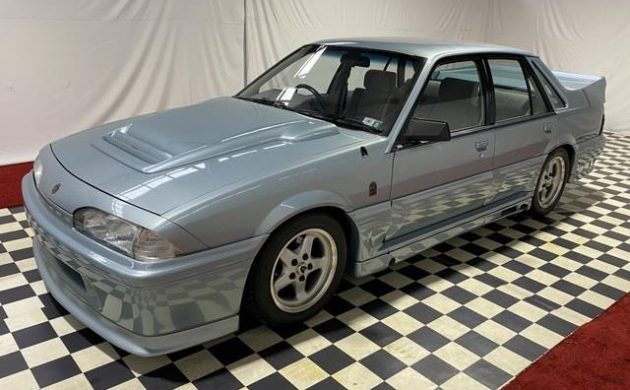
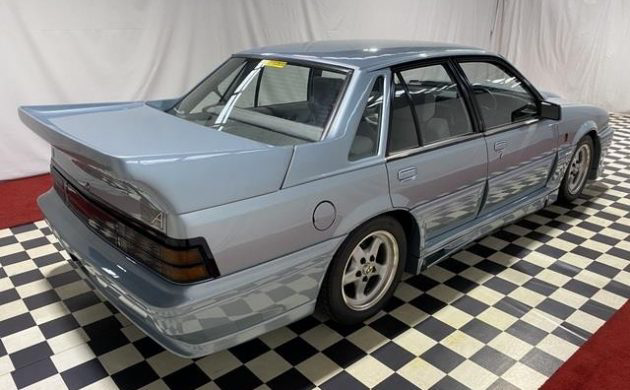
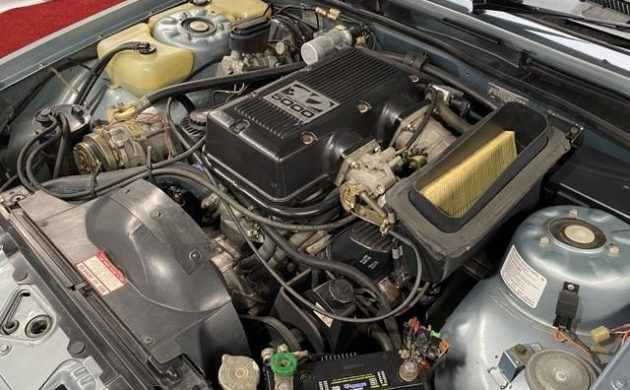
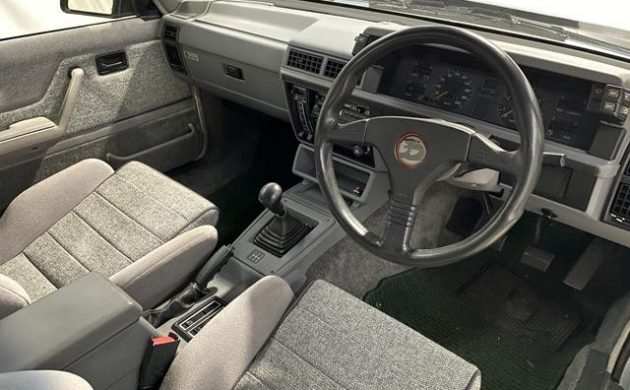
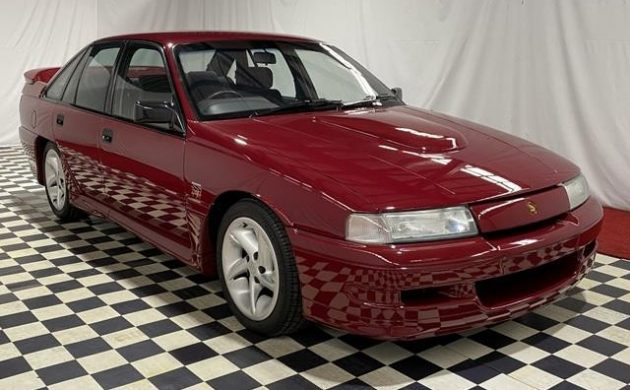
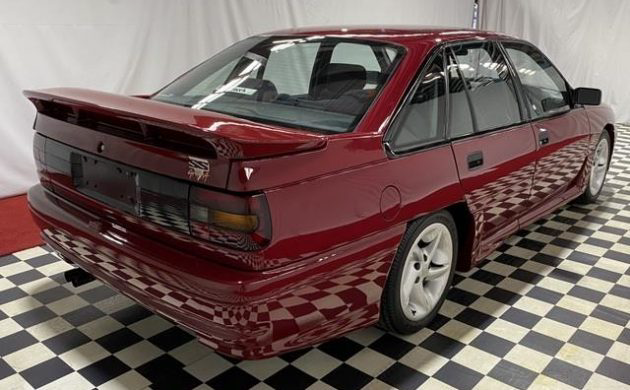
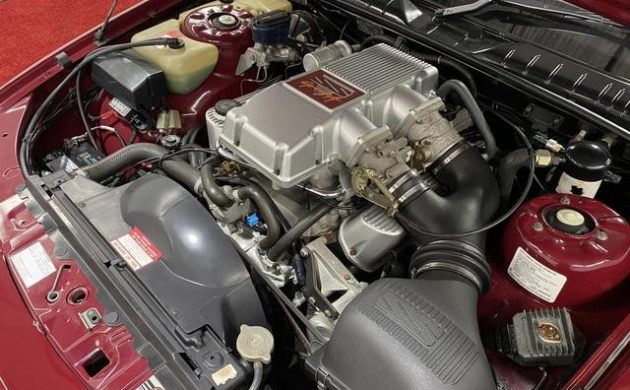
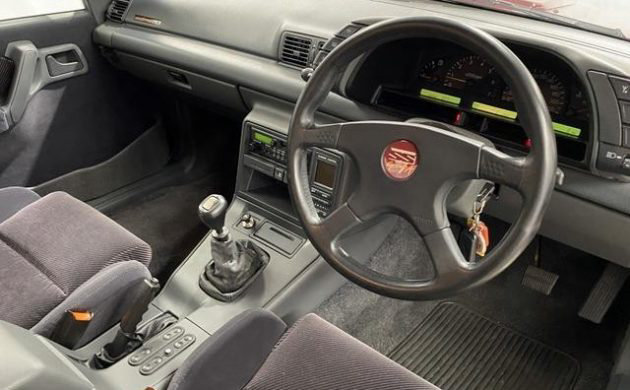
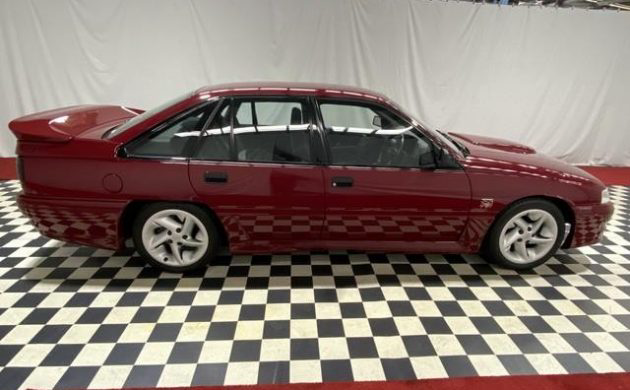



Teriffic writing on these pieces of history! Thank you for all of your diligence, Adam C.!
Ok, the first Commodore, the grey one, I admit it’s a little overdone. I know it’s not for most, but I love the boxy four doors (my fave car, the ’88 M5) and I would love to drive this around the Puget sound area… So sad that Holden is gone. Yes, the price is unbelieveable, but what do you do… You don’t have to buy it.
It’s similar in shape to Dick Johnson’s car that hit the barrier (and various other things!) coming out of the Dipper onto Conrod on his flying qualifier. More plastic, though, so probably newer.
Coming out of Forest’s Elbow. And Dick had no one but himself to blame.
Forest’s Elbow. Dick had no one else to blame but himself.
Sent me off down a Bathurst rabbit hole, that did…
D.J. was driving a Falcon. Duh…!
Qually lap, or most of one… (he was ok).
https://www.youtube.com/watch?v=WpNqdpVebMY
And here, folks, is how to become the most popular bloke at your local C&C. These cars are both unbelievably cool. If you always wanted something that you’d never see another of…then one of these is the solution.
OK, I observe people are so sad for Holden being phased out but so also for other coveted GM brands having left us recently like Oldsmobile and Pontiac. Not to forget both SAAB and Opel.
While I somehow understand that sadness I have a notion that maybe was for the best? Actually I think they should’ve thrown in the towel years ago and went down with pride…? As an old car aficionado I must confess neither of these brands have come up with something really desirable for several years, most of their offerings being extremely boring badge-engineered variants of themselves.
Those I probably have most sympathy for are those living ‘down under’. Holden was their own unique brand offering several beautiful and interesting designs combining European and American flair in their heyday. It must have been a sad thing to observe Holden end up solely as Aussie-made Isuzus, Opels or Chevs. Those who are observant will note the Holdens in this write-up are based on Opel Omega/ Vauxhall Carlton – but none of them ever sold in versions as hairy as these Holdens!
@local_sheriff Doesn’t it make it even more sad? I grew up riding shotgun in my dad’s Opel GT… I am sad they are gone and I loved Saab but in the end most makes don’t go out on top. Look at Hudson selling rebadged Nash’s and the infamous “Packardbakers” You would have to back to the depression with makes like Cord and Auburn (same company I know) who were trying to survive with innovation in a crowded desperate market and died. But in reality those companies died with a whimper too. I think Holden, Opel, Saab, Pontiac and Oldsmobile (All part of GM) died selling badge engineered garbage because the general was running out of money to spend on unprofitable divisions. Sure, I think they missed opportunities with Holden and Saab and I hope to this day that someone will grab Saab. but it makes poor business sense for a company to dump tons of money at something that you know you won’t get any money back from.
And to my original point. That is the saddest thing of all
RIP Holden (and Saab, Oldsmobile, Opel, Pontiac, AMC, Packard, Plymouth, De Soto, Cord Auburn, Hupp, Kaiser, Eagle, Isuzu, Suzuki and all the one’s I am missing)
Are either of these cars equipped with Peter Brock’s infamous Energy Polarizer?
https://prod.static9.net.au/fs/c805f58e-a785-4d9c-bb19-26285b24224b
Great article
Would love to have either of these (luckily we drive on the left here too)
@electronika Suzuki is still making cars though they have been out of the US market for a long time (just bought a 2020 SX4 for the wife)
I really wish Isuzu had kept making cars some of there last JDM offerings in the 80″s were a hoot to drive.
$225,000.00 Seriously?
With respect to SAAB, Saab people tried valiantly to save the company, but in the end, there was really nothing left to save. The 9.3 was a warmed over Opel that shared a platform with the Chevy Malibu. GM shot Saab in the foot by blaring this fact out in Malibu ads……people thought the 9.3 was the same as the Malibu…..and while the 2003-2011 9.3 wasn’t really a Saab, it was a lot better car than the corresponding Malibu. Saabistas argue which Saab was really the last true Saab…..I argue that it’s the 2002 9.3/2009 9.5. I have two 99s (including a ’78 Turbo), 5 Classic 900s (including an ’88 SPG and a ‘vert), a New Generation 900, a 2000 9.3 and an ’01 Viggen……these truly are Saabs. I drove every iteration of the 9.3 built after 2002 and hated every version……didn’t feel or drove like Saabs and was clearly built to a price.
I was never a big GM fan, but even if you offered me the best that GM has to offer (which isn’t saying much) to drive, free of charge, I’d turn it down. I despise GM and what they did to Saab.
These look like a Chevy lumina ss with more cladding but the v8 and manual are the heartbeat but not at that kind of $cratch museum pieces only never to be driven
V8 + Manual + Rear wheel drive.
Ironically the later Commodores were sold in Africa and the Middle East in LHD form as Chevrolet Luminas, the only parts shared with the US market Luminas being the actual badging.
prices on all Aussie muscle cars , and some of the more pedestrian models in good condition are going through the roof down here now, they won’t be making any new models so everyone wants to grab a piece of local history while they can
A mate of mine has just recently finished building a 5 litre VN SS Commodore, he had to make one out of two as the first one had been stolen although the original ID plates were present the other car had the correct interior and other parts, he was a historic commercial vehicle enthusiast but the Commodore is his new love
It’s hard to imagine now, but after the 500 had been built for homologation, GMH had problems trying to sell what was left over from racing requirements. They were still around long after the VN hit the market. In the end they took all the flairing kit of them and rebadged them as Calais, which was an upmarket Commodore.